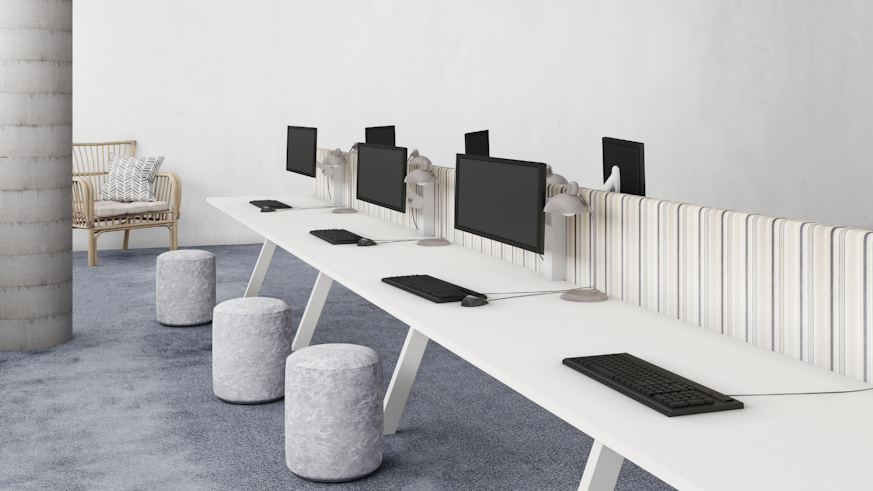Circular economy estates
12 May 2021

Transforming workspaces while delivering social value and reducing carbon emissions was the focus of the latest in Cardiff Business School’s Breakfast Briefing Series.
Dr Carolyn Strong, Reader in Social and Ethical Marketing and Cardiff Business School’s Academic Director of Estates, got proceedings underway by sharing a series of before and after images from School refurbishment projects.
Over the course of the last three years, Cardiff Business School’s Estates Team has taken a radical new approach to projects such as these in collaboration with external suppliers and designers like Rype Office, Greenstream Flooring and Merthyr Tydfil Institute for the Blind.
Dr Strong said: “Working closely with these organisations means we’re not only ensuring that all our building and estates work is sustainable, but that they also create value for local businesses who advocate diverse for employment practices.”
Dr Strong showed how spaces like the School’s Common Room, Board Room, Staff Offices and Teaching Spaces were re-imagined through re-use, recycling and repurposing of materials as part of a circular economy makeover.
One of Dr Strong’s collaborators Dr Greg Lavery, Managing Director of Rype Office, followed by sharing his further insights into the Cardiff Business School refurbishment projects.
Dr Lavery referenced research on the green house gas emissions of a commercial building over its lifespan, explaining that spaces needn’t be knocked down and started again in order to create spaces that are fit for purpose.
He said: “The data suggest that 30% of the greenhouse gas emissions over the entire life of the building are related to furniture. And that's because on average every 5 to 10 years the entire contents of a building including the flooring are put into a skip, and new stuff is bought.”
Dr Lavery explained that a common misconception is that most of the greenhouse gas emissions are in the frame and the structure, the shell and core of a building and so refurbishment can influence very little.
He added: “Well, the data shows this to be untrue. If you're refurbishing with furniture, flooring, wall finish, electrical air conditioning and therefore impacting a lot of operational energy through your use of LED lights and various other efficient equipment, actually you can impact close to 75% of the greenhouse gas emissions.”
Dr Lavery moved onto discuss the design process Rype Office implemented for Cardiff Business School’s refurbishment, including:
- Sofas with recycled fabric made by Merthyr Tydfil Institute for the Blind
- Table frames repurposed from Cardiff Business School’s cafeteria
- Flooring supplied and laid by Greenstream flooring - who employ the long-term unemployed
- Remanufactured sit-stand desks and chairs
Dr Lavery concluded his presentation by explaining the ethos behind Rype Office and what the future holds for estate-wide circular economy.
Before moving to a question and answer session, Dr Strong looked ahead to upcoming Cardiff Business School projects and mooted the idea of an Estates Network to share ideas and best practices across the the institution and beyond.
Cardiff Business School's Breakfast Briefing Series is a network of events, which enables business contacts to find out more about the latest research and key developments from industrial partners.
Following lockdown measures, implemented by Welsh Government in response to the COVID-19 pandemic, the School’s Executive Education Team has moved the series online.
If you were unable to attend, watch this recording of the event.
Share this story
Enabling our business contacts to find out more about latest business research and key developments from industry partners and practitioners.

